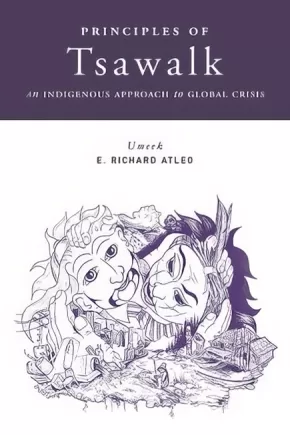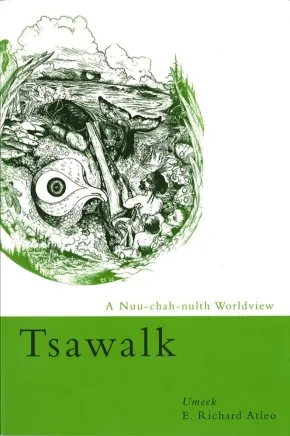E Richard Atleo
E. Richard Atleo, whose Nuu-chah-nulth name is Umeek, is a hereditary chief and served as co-chair of the internationally recognized Scientific Panel for Sustainable Forest Practices in Clayoquot Sound. He created the First Nations Studies Department at Malaspina University (now Vancouver Island University), where he taught until 2004.
Books (2)
Synopsis:
Tsawalk, or “one,” expresses the Nuu-chah-nulth view that all living things – human, plant, and animal – form part of an integrated whole brought into harmony through constant negotiation and mutual respect. In this book, Umeek argues that contemporary environmental and political crises and the ongoing plight of indigenous peoples reflect a world out of balance, a world in which Western approaches for sustainable living are not working. Nuu-chah-nulth principles of recognition, consent, and continuity, by contrast, hold the promise of bringing greater harmony, where all life forms are treated with respect and accorded formal constitutional recognition.
Additional Information
220 pages | 6.00" x 9.00" | Paperback
Synopsis:
In Tsawalk, hereditary chief Umeek develops a theory of "Tsawalk," meaning "one," that views the nature of existence as an integrated and orderly whole, and thereby recognizes the intrinsic relationship between the physical and spiritual. Umeek demonstrates how Tsawalk provides a viable theoretical alternative that both complements and expands the view of reality presented by Western science. Tsawalk, he argues, allows both Western and indigenous views to be combined in order to advance our understanding of the universe. In addition, he shows how various fundamental aspects of Nuu-chah-nulth society are based upon Tsawalk, and what implications it has today for both Native and non-Native peoples.
A valuable contribution to Indigenous studies, anthropology, philosophy, and the study of science, Tsawalk offers a revitalizing and thoughtful complement to Western scientific worldviews.
Reviews
"It provides a holistic, spiritual perspective, in contrast to the objective, Cartesian perspective of western science. Atleo argues, successfully I believe, that this spiritual view of nature is in many ways superior to the western disenchantment of the world. This book is one that will be valuable for scholars of the Northwest Coast, traditional ecological knowledge, and indigenous intellectuals. As well, it will probably fine a popular audience among those interested in First Nations, environmentalism, and, of course, New Age philosophy." — Michael Harkin, University of Wyoming, Journal of Anthropological Research, Spring 2005
Additional Information
168 pages | 6.00" x 9.00"








